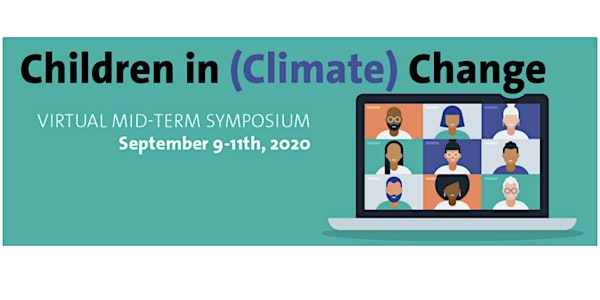
Childhood in (Climate) Change - Virtual Mid-term Symposium
Virtual Mid-term Symposium / Online event, 9-11th September 2020
Location
Online
About this event
Childhood in (Climate) Change
Virtual Mid-term Symposium
European Sociological Association RN04 Sociology of Children and Childhood
Online, 9-11th September 2020
By addressing Childhood in (Climate) Change, this 5th mid-term symposium builds on the former mid-term events of the ESA Research Network 04 (Sociology of Children and Childhood) that took place in Jyväskylä (Finland), Modena (Italy), Ghent (Belgium) and Lisbon (Portugal), as well as the exchanges within this network during the bi-annual conferences of the European Sociological Association. It will confront a major issue underpinning these discussions, namely how social theories can account for continuities and change in childhood.
Researching childhood requires not only addressing biological, developmental, cultural, and legal perspectives in critical ways, but mainly analysing their intersectionalities in the constitution of the social ordering of children’s experiences. Hence, childhood cannot be reduced to one of these perspectives: it cannot be understood solely in terms of bodily characteristics, nor in terms of cognitive developments, nor in terms of cultural or legal treatment in specific contexts. It is, rather, an outcome of the encounters of all these factors: childhood encompasses sets of experiences that stem from and engender configurations of biological, psychological, social, cultural, legal and economic contexts.
Theoretically, childhood studies have strong roots in the « social construction of childhood » (Alanen 2015) and (still) rest on foundational critiques that led to a logic of replacing perspectives rather than integrating them in a broader framework. Sociologists of childhood have subsequently, however, contributed further insights by learning from « forms of experience » they observe in, with and within children and extending into wider areas of social theory. These highlight how and why childhood encompasses specific forms of experience in different contexts but also how different childhoods can be constructed and experienced in similar contexts. There is a need for stronger theoretically grounding to our understanding of forms of experience, contexts and interactions and how they contribute to shape and are shaped by life courses.
We know that not only do social configurations constrain and enable specific trajectories, they also induce major changes in the overall environment. Climate change (becoming a climate emergency) is a visible and sensitive outcome of human institutions including their social constructions of childhood. The climate crisis also puts forward new forms of relation between human/non-human animal, materials and emotions. Children are co-constructors of these interactions, which can challenge established categories (adults/children, nature/culture) and also frontiers between them". How children make sense of the challenges of global warming, how they react to this worldwide threat or how their everyday life is affected by it, is of course also enabled and constrained by the structures of power in human institutions. But climates are not only meteorological, the word climate can also refer to the prevailing trends of public opinion or economic (in)equalities, and any another ongoing aspect of social life.
With the aim of not only understanding but also transforming prevailing trends, the topic Childhood in (Climate) Change is of pressing current relevance. We anticipate that it may enable contributors and participants to identify and understand how theoretical accounts of continuity and change in childhood might be communicated to and by our academic peers and the children we work with and for. The potential political impact of such an integration is a crucial question in the face of the many casualties of social, cultural, economic and environmental inequalities.
The 5th Mid-Term Symposium will be an online event, from September 9th until September 11th 2020. It will address the issue of Childhood in (Climate) Change by inviting scholars to submit theoretically and empirically informed papers on the following sub-topics (the same topic from different angles) :
Children and…
Changing climates
Changing childhoods
Changing identities
Changing societies
Changing economies
Organizers
RN04 - Sociology of Children and Childhood
Developing critical research on children’s lives and positions in societies and on childhood as a social phenomenon
From a modest start in the 1980s, through increasing empirical and theoretical activity in the 1990s, the sociology of childhood research has become well established internationally. This field of study has developed critical alternatives to mainstream research on children and has generated significant contributions to understanding childhood as a social phenomenon and children’s lives and positions in societies. The importance of children and childhood(s) as topics for sociological study is reflected in a growing community of scholars engaged in theoretical and empirical work in this area across Europe. This includes work looking at children living in times of political change and transition, engagements with understanding childhood as a structural space in societies, and explorations of children’s everyday lives from their own perspective. These areas, together with issues of theorising childhood and methodological developments, will form important foci for the Research Network.
Centre for Children's Rights Studies, University of Geneva (Switzerland)
The Centre for Children's Rights Studies of the University of Geneva (Switzerland) offers several education programmes related to Children's Rights including a Master's degree in Children's Rights Studies is available, a Master of Advanced Studies (MCR), as well as a Certificate of Advanced Studies in Children's Rights (CAS) and several Diploma of Advanced Studies (DAS).
Programme
The programme of the Mid-Term Symposium is not available yet.